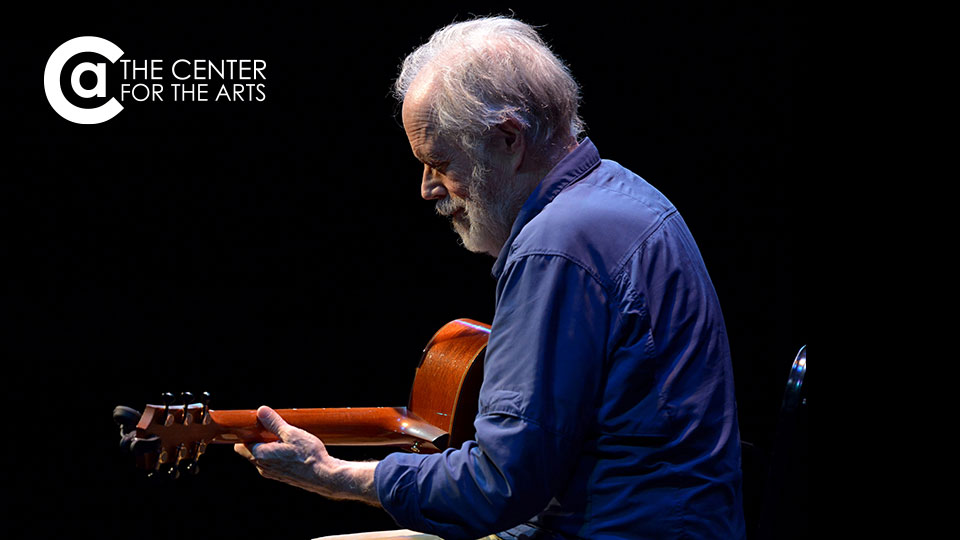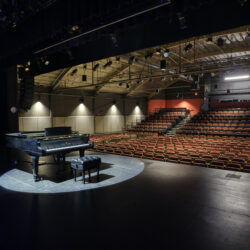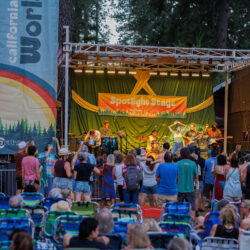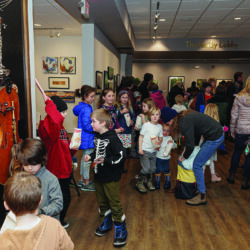After fifty years of performing and recording more than forty albums, Kottke’s unique finger-picking style has transformed steel-string guitar playing and inspired new generations of musicians. Often described as eccentric, Kottke attributes this to being “a self-taught solo musician.” He is known to perform with an intense focus that carries the audience away; then he brings them back with engaging interludes of droll storytelling and gravelly vocals, which Kottke describes as “geese farts on a muggy day.”
Born in Athens, Georgia, and raised in twelve different states, Kottke absorbed a variety of musical influences. At age one and a half, he loved Stravinsky, and as he grew, his musical palate grew, too, from country-blues Mississippi John Hurt to march-master John Phillip Sousa and percussionist Preston Epps. At age five, he took up the violin and then switched to trombone, which he was dedicated to studying. Then his mother gave him a toy guitar to play when he had been sick in bed for two months. Kottke said that it saved his life.
When Kottke picked up the guitar at age 11, it was a lightning rod. “I knew instantly that I’d be playing for the rest of my life and that it was all I wanted to do. I didn’t have to think about a job. I could just go with it. It was a spiritual experience and remains one,” spoke Kottke in an interview with Anil Prasad. To say that Kottke is at one with his guitar is an understatement; it’s more transcendent than that. To hear him play steel-string guitar is to touch the mysteries and complexities of the man beyond himself. “I see everything through the guitar,” said Kottke (Anil Prasad, “Choice Reflections,” https://www.innerviews.org/inner/kottke2.html).
As a young man, Kottke dropped out of the University of Missouri after a year, hitchhiked across the country, and joined the Navy, carrying his twelve-string along with him. Discharged in 1964 due to a hearing-loss injury, Kottke settled in the Twin Cities area and became a fixture at Minneapolis’ Scholar Coffeehouse, which had been home to Bob Dylan and John Koerner. His1968 debut album, “Twelve String Blues,” was recorded on a Viking quarter-inch tape recorder, for the Scholar’s tiny Oblivion label. (The label released one other LP by The Langston Hughes Memorial Eclectic Jazz Band.)
John Fahey signed Kottke to his Takoma label, and in 1969 released what has become known as “the Armadillo” record due to the graphic of an armadillo on the cover. The classic album was reportedly recorded in three hours and featured both six- and twelve-string guitar instrumentals. Fahey and his manager Denny Bruce soon secured a recording contract with Capitol Records for Kottke.
Kottke’s 1971 major-label debut, “Mudlark,” positioned him somewhat uneasily in the singer-songwriter genre, despite his own wishes to remain an instrumental performer. Still, despite arguments with label executives, as well as with Bruce, Kottke flourished during his tenure on Capitol, as records like 1972’s “Greenhouse” and 1973’s live “My Feet Are Smiling” and “Ice Water” found him branching out with guest musicians and honing his guitar technique.
With 1975’s “Chewing Pine,” Kottke reached the U.S. Top 30 for the second time; he also gained an international following thanks to his continuing tours in Europe and Australia.
Kottke collaborated with Phish bassist Mike Gordon on the album “Clone” in 2002. A follow-up album was recorded in 2005 in the Bahamas called “Sixty-Six Steps,” produced by Leo’s old friend and Prince producer David Z.
Kottke has been awarded two Grammy nominations; a Doctorate in Music Performance by the Peck School of Music at the U of Wisconsin, Milwaukee; and a Certificate of Significant Achievement in Not Playing the Trombone from the U of Texas at Brownsville with Texas Southmost College.
Leo Kottke performs at the Foothills Event Center on Friday, March 6th, as a part of The Center for the Arts OnTheGo series. Doors open at 7:00 pm for the 8:00 pm show. Tickets are available online at thecenterforthearts.org, at Briarpatch Co-op, and at the temporary box office in the Grass Valley Chamber of Commerce located at 127 E Main Street, Downtown Grass Valley, CA. Learn More.




